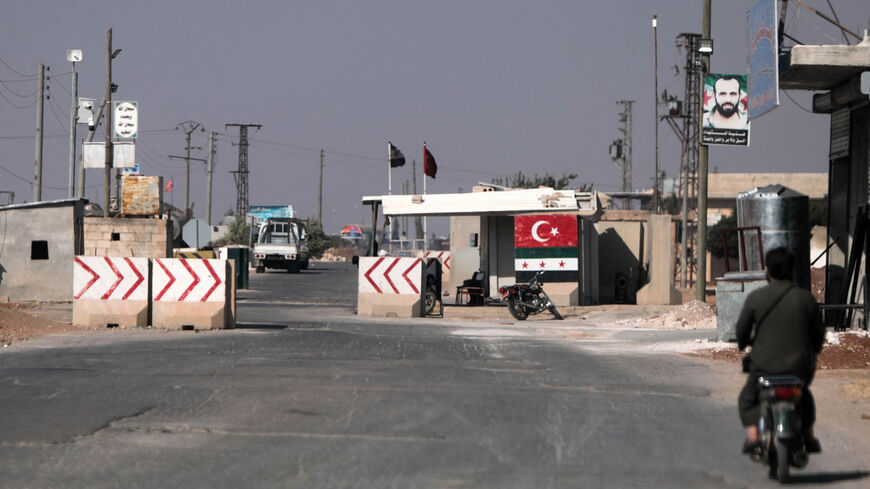
As the Turkish-backed opposition factions prepare for an imminent Turkish ground operation against Kurdish forces in northern Syria, questions arise about the potential participation of Hayat Tahrir al-Sham in the battle.
The Turkish-backed factions in northern Syria are gearing up for an imminent ground operation led by Turkey against Kurdish forces, which Ankara accused of being behind the Nov. 13 Istanbul bombing that killed six people.
Speaking to reporters in Ankara Nov. 21, Turkish President Recep Tayyip Erdogan vowed to eradicate “terrorists” — in reference to Kurdish forces — from the areas of Tal Rifaat, Manbij and Ain al-Arab in northern Syria. These areas are controlled by the Syrian Democratic Forces (SDF), an alliance of Arab and Kurdish fighters backed by the United States.
Erdogan confirmed his country will launch a ground operation in northern Syria at the “appropriate time.” He also warned, “The operations we carry out with planes, artillery and unmanned combat aerial vehicles are just the beginning.”
The threats coincide with escalating Turkish airstrikes in northern Syria and Iraq against Kurdish targets.
Hisham Eskeef, an official at the political bureau of the Turkish-backed Syrian National Army, told Al-Monitor, “The battle is imminent, our preparations are in full swing, and we have deployed great capabilities.”
He said, “There may be a major military operation that is not limited to one axis, such as Ain al-Arab. We were requested by Turkey to show utmost readiness and a joint operations room was formed between us and the Turkish army. We are now close to launching the operation. The first areas that we will liberate from the Kurdish forces are Tal Rifaat and the 36 surrounding Arab villages.”
Eskeef noted, “We will not allow Hayat Tahrir al-Sham [HTS] to be involved in the upcoming operation, since it is listed as a terrorist organization and we are fighting against terrorism.”
However, a military leader in HTS nicknamed Abu Hashim who resides in Idlib told Al-Monitor, “Turkey may ask HTS to join the battle, but it has yet to do so. This could be due to the fact that HTS is more experienced in military operations than the Free Syrian Army [FSA] factions and received more training. If we do take part in this battle, we will achieve great gains, such as expanding the geographical areas under the control of the Syrian opposition. Also, some HTS leaders hail from areas controlled by the SDF such as Tal Rifaat and Manbij, and may recruit many young fighters from these areas.”
He said, “The FSA factions do not have a say regarding our participation. This is Turkey’s decision.”
Shuran Muhammad, an SDF leader who resides in Manbij, told Al-Monitor, “We are ready for this battle. If Turkey attacks us, we will respond in every way we can. We will respond with qualitative operations that we have not waged before.”
He noted, “Turkey has asked Russia to secure our pullout 32 kilometers [20 miles] from the border in exchange for the entry of the Syrian regime to the areas we leave. But this will not happen. We have sacrificed blood to liberate our areas from the Islamic State [IS]. Unfortunately, we expect a US betrayal and a Russian abandonment, but we will not surrender. Kobani [Ain al-Arab] is a symbolic city. It is where we besieged and defeated IS in 2014 and sacrificed hundreds of lives. How can we abandon this city?”
Turkey insists that the People’s Protection Units, the main component of the SDF, withdraws 32 kilometers from the Turkish borders under the so-called Sochi deal, which Moscow and Ankara agreed to in October 2019. Under this deal, joint Russian-Turkish patrols would patrol the east and the west of the Operation Peace Spring areas in north Syria within 10 kilometers (6 miles) of the Turkish-Syrian border, except in the city of Qamishli.
The deal also stipulated the withdrawal of all Kurdish units and their weapons from the cities of Manbij and Tal Rifaat in Aleppo’s countryside, and taking the necessary measures to prevent the infiltration of any terrorist elements into these cities.
